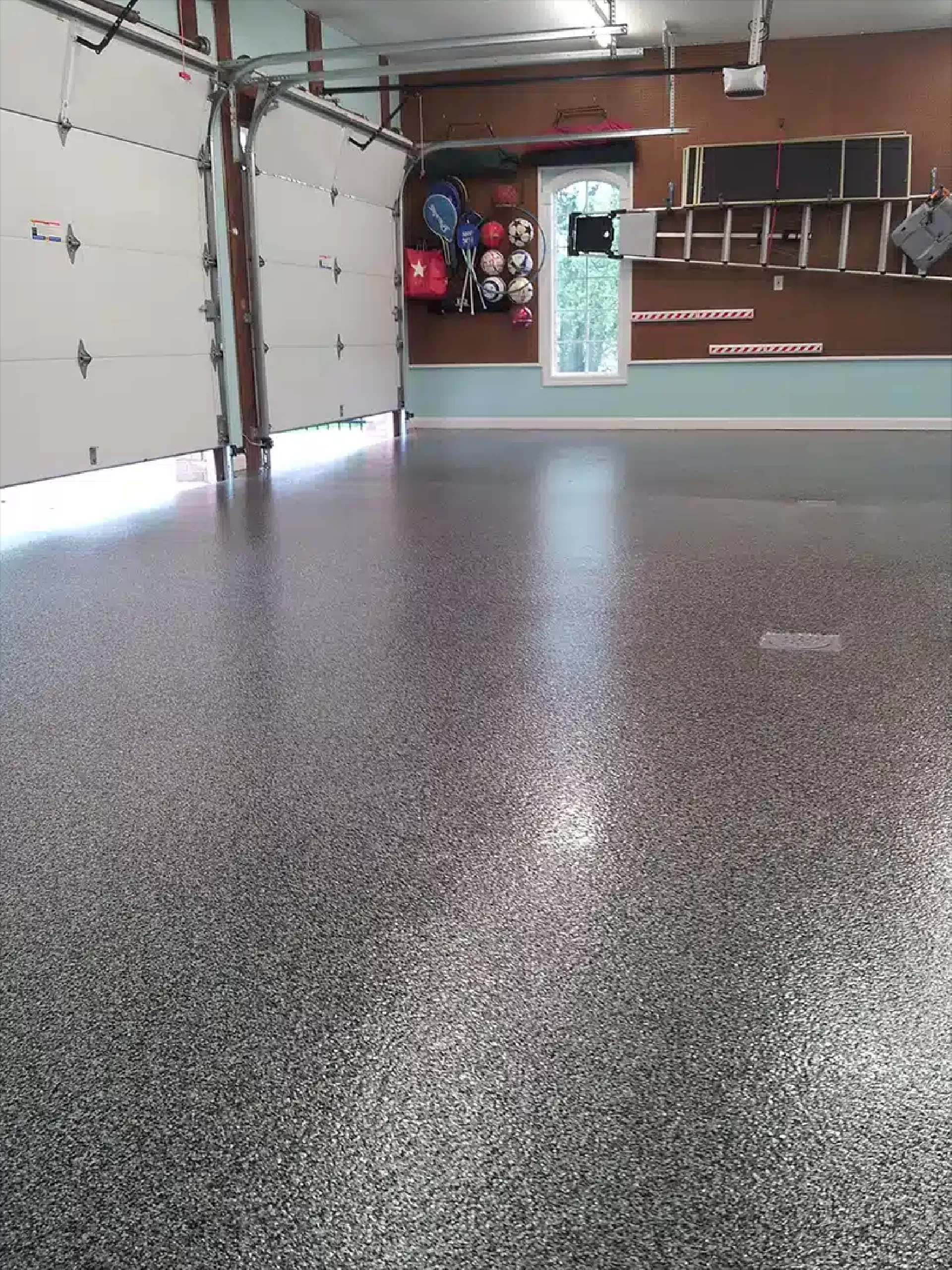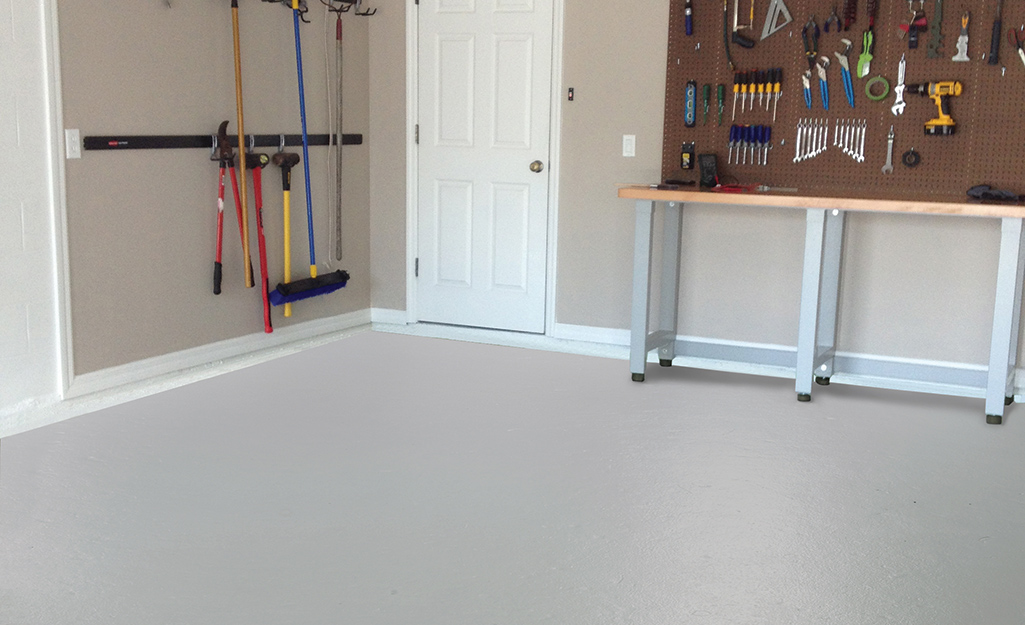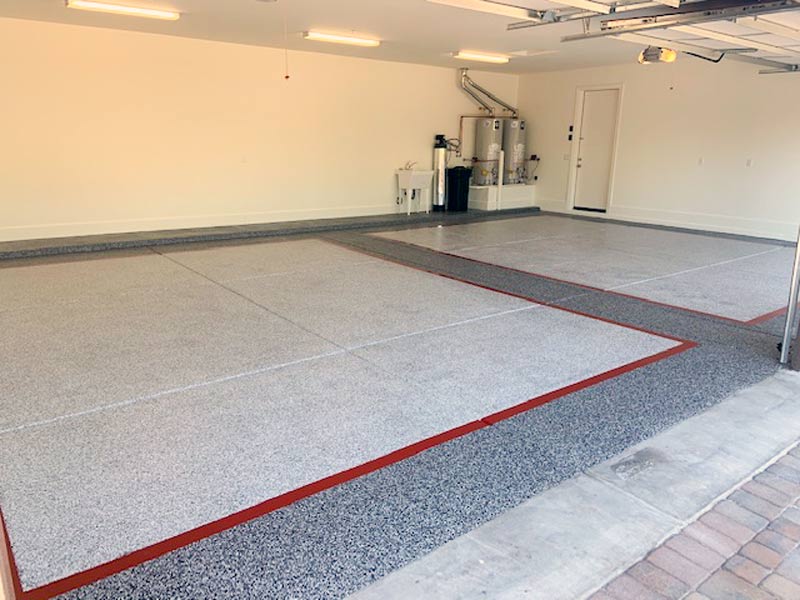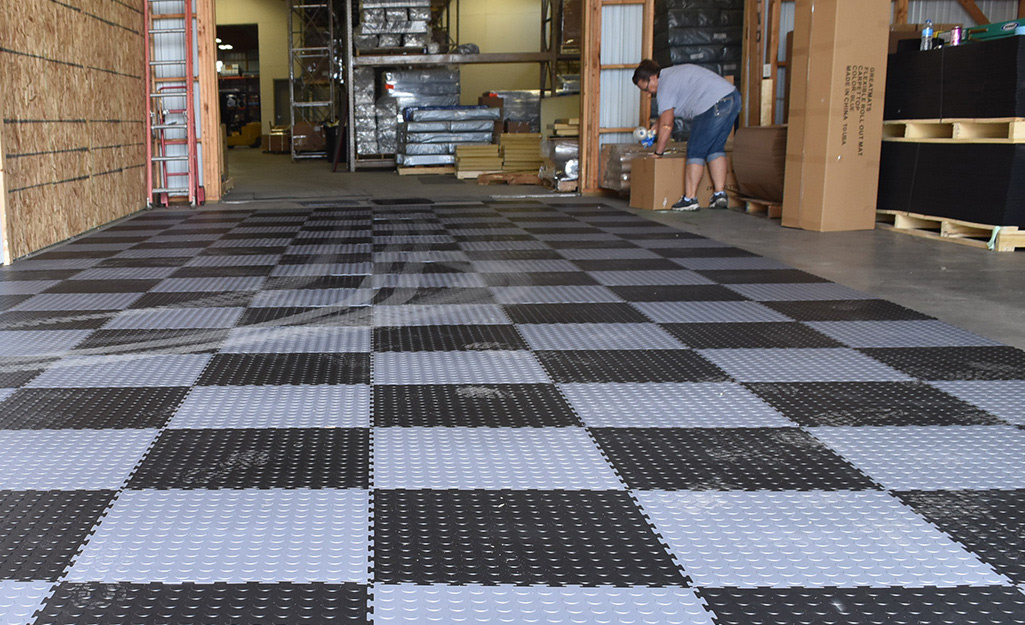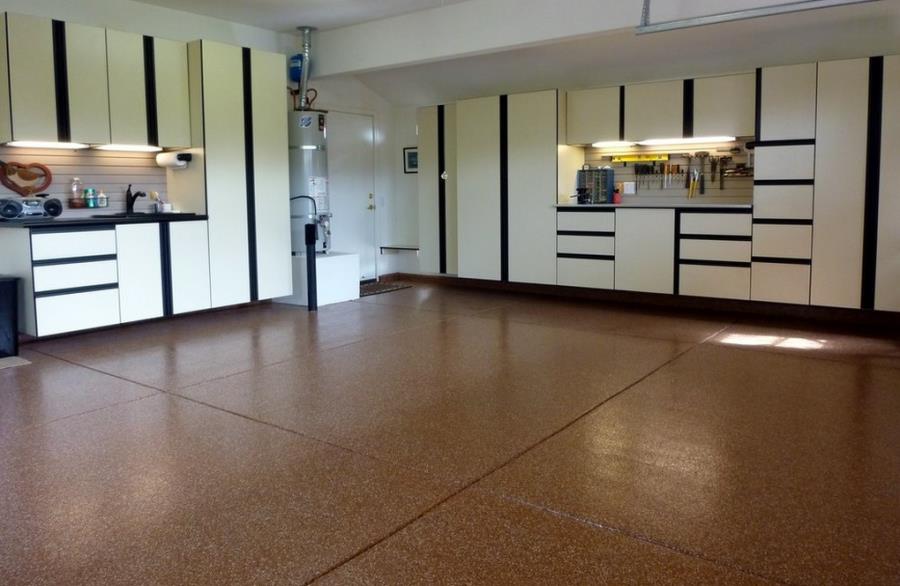Latex Garage Floor Paint: Budget-Friendly and Easy to Use
Latex paint is often the first choice for homeowners looking for a low-cost and easy-to-apply option for their garage floors. It’s water-based, dries quickly, and doesn’t require any professional tools or skills to apply. If you’re after a simple and affordable way to refresh the look of your garage, latex paint can be a good starting point.
- One of the biggest advantages of latex paint is its ease of use. You can apply it with a regular paint roller, and cleanup is as simple as rinsing tools with water. There’s no strong odor, and it dries relatively fast, usually within a few hours, which means you can complete a weekend project without waiting days to walk on the surface.
- Latex garage floor paint comes in a variety of colors and finishes. You can find it in standard grays, tans, and off-whites, but some brands also offer more vibrant hues if you want something a little more bold. The semi-gloss finish helps reflect light, which can make your garage feel brighter and more inviting.
- However, latex paint is not the most durable option. It tends to wear faster under heavy traffic, especially from hot tires or sharp tools. If your garage gets a lot of use or you park multiple vehicles there, latex paint might not hold up more than a couple of years without reapplication.
- It also doesn’t offer much in terms of chemical resistance. Oil, gasoline, and solvents can stain or even dissolve latex paint if spills aren’t cleaned up immediately. For workshops or garages that store vehicles, this can become a major downside.
- Still, for light-use garages or cosmetic upgrades, latex paint serves its purpose. It’s inexpensive, easy to apply, and easy to touch up, which makes it ideal for homeowners on a tight budget or those who want to refresh a neglected space quickly.
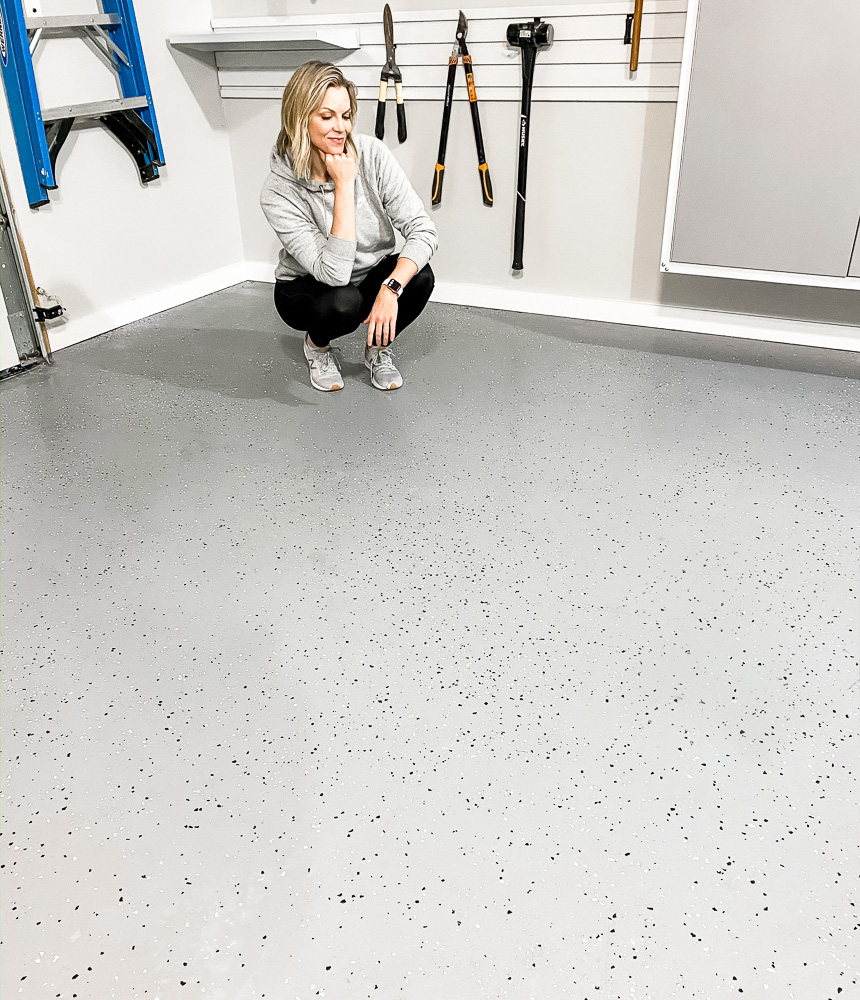
Epoxy Coatings: Durable and Chemical-Resistant
Epoxy floor coatings are often considered the gold standard for garage floors, and with good reason. They provide a hard, durable surface that stands up to wear, chemicals, and heavy equipment. If your garage serves multiple functions or if you want a long-lasting solution, epoxy is worth considering despite the higher upfront effort and cost.
Epoxy is a two-part system. It combines a resin with a hardener, and once the two are mixed, they begin to cure. This process creates a thick, hardened surface that’s far more resilient than traditional paint. Because it cures rather than just dries, epoxy bonds strongly to the concrete below.
This type of floor coating can handle extreme abuse. Whether it’s hot tire pickup, dropped tools, or chemical spills, epoxy can stand up to it. It doesn’t stain easily, it resists abrasion, and it can last for many years without needing reapplication—assuming it’s properly installed.
Epoxy coatings come in various finishes and customization options. You can choose solid colors, add color flakes for a terrazzo-like appearance, or opt for a high-gloss clear coat for a sleek industrial look. These decorative options allow you to personalize your garage without compromising durability.
Application requires careful prep and timing. The floor must be cleaned thoroughly, etched or ground to promote adhesion, and completely dry. Once the epoxy is mixed, you have a limited time to apply it. It also needs several days to cure before the garage can be used again. Skipping any steps can result in peeling or bubbling.
Though more expensive and labor-intensive, epoxy is a smart investment. For garages that see frequent traffic or for homeowners who want to avoid frequent repainting, epoxy delivers the best balance of strength, aesthetics, and low maintenance.
Polyurethane and Polyaspartic Coatings: High-End Performance
If epoxy is the heavy-duty workhorse of garage floor coatings, polyurethane and polyaspartic options take things a step further. These coatings are known for their superior flexibility, chemical resistance, and UV stability. They’re most commonly used in commercial settings but are becoming more accessible for residential use as well.
Polyurethane coatings are flexible and resistant to scratches. Unlike epoxy, which can become brittle over time, polyurethane remains slightly elastic, which helps it absorb minor impacts and vibrations. This makes it ideal for garages where heavy equipment is used or dropped.
Polyaspartic coatings are known for their fast curing time. They can be applied and cured in just a single day, even in cold or humid conditions. This is a major advantage for anyone looking to finish the job quickly without sacrificing durability.
Both options offer excellent UV resistance. Unlike epoxy, which can yellow or chalk over time if exposed to sunlight, polyurethane and polyaspartic coatings stay color-stable. If your garage door is often left open or if there are windows letting in sunlight, this is a key consideration.
They also provide a non-slip surface when mixed with traction additives. For garages that double as workshops or fitness areas, having a floor that stays grippy even when wet adds a layer of safety. You can choose between satin, semi-gloss, and high-gloss finishes depending on your preference.
The biggest downside is cost and complexity. These coatings are more expensive than epoxy and typically require professional installation. If you have the budget and are looking for a premium, long-lasting finish, though, the investment can be worth it.
Concrete Stain and Sealer: Natural Look with Minimal Effort
Some homeowners prefer to preserve the natural look of concrete while still adding some protection and visual appeal. That’s where concrete stains and sealers come into play. These products don’t sit on top of the concrete like paint; instead, they penetrate the surface to provide color and seal it from moisture and stains.
Concrete stains come in acid-based and water-based varieties. Acid stains react chemically with the minerals in the concrete, producing a mottled, earthy look that’s impossible to replicate with paint. Water-based stains offer more predictable colors and are easier to apply.
The final look is more subdued and organic. You’ll still see the texture of the concrete, which some people really appreciate. The result is often a warm, natural finish that works well in garages used for more than just parking—such as man caves, home gyms, or hobby rooms.
Stains don’t provide much surface protection on their own. That’s why they need to be sealed with a clear coat to prevent oil stains, water intrusion, and fading. Sealers come in matte, satin, and gloss finishes and need to be reapplied every few years.
Application is fairly straightforward. You’ll need to clean and prep the floor, apply the stain with a sprayer or brush, let it dry, and then seal. The whole process is quicker and simpler than applying epoxy or polyurethane, though the result is less durable.
Concrete stain and sealer work best for decorative garages. If your garage doesn’t see a lot of abuse and you’re mainly looking to add some character to a plain concrete floor, this option gives you color and charm with minimal investment.
Choosing the Right Option Based on Garage Use
Every garage is used differently, and the best paint or coating depends on how you use the space. I’ve worked with people who use their garage as a full-fledged workshop, and others who simply want a cleaner, less dusty place to park. Knowing how you’ll use the floor helps narrow down your options significantly.
For basic storage or light parking, latex paint is usually enough. If you’re storing household items or only parking occasionally, you don’t need industrial-strength coatings. A few coats of latex paint can clean up the space and make it easier to sweep or mop.
If your garage doubles as a workspace, epoxy is a strong choice. Whether you’re working on cars or running a small workshop, epoxy gives you the toughness you need to handle messes, tools, and rolling equipment without damage.
For high-end finishes and fast application, consider polyaspartic coatings. These are ideal for homeowners who want fast installation and exceptional durability. While more expensive, they can be walked on within hours and driven on within a day.
For aesthetic upgrades with a natural look, concrete stains fit well. If you want to preserve the concrete feel but add some warmth or color, this option provides a unique, attractive finish with low maintenance requirements.
Think long-term and factor in reapplication and maintenance. Paints will eventually wear down and need refreshing. Epoxy and polyurethane last longer but cost more upfront. Consider how much time, money, and energy you’re willing to invest now versus later.
What is the best garage floor paint for durability?
Epoxy coatings are widely considered the most durable option. They bond strongly to concrete and resist wear, chemicals, and heat, making them ideal for high-traffic garages or workspaces.
Can I paint a garage floor myself?
Yes, especially if you choose latex or concrete stain. Epoxy and polyurethane are also DIY-friendly, but they require more preparation and attention to detail. Always follow the product instructions carefully.
How long does garage floor paint last?
Latex may last 1–2 years with light use. Epoxy can last 5–10 years, depending on conditions. Polyurethane and polyaspartic coatings often last even longer with proper care.
Do I need to seal the floor after painting?
Not always. Epoxy and polyaspartic coatings act as sealers. Latex paint may benefit from a clear topcoat for extra protection. Concrete stains always require sealing to protect the surface.
How should I prepare the floor before painting?
Remove all dirt, grease, and oil. Etch or grind the concrete to open the pores, which helps paint or coatings bond better. Make sure the surface is dry before application.
What’s the best paint for garages with sun exposure?
Choose a UV-stable product like polyurethane or polyaspartic coatings. These resist yellowing and fading better than standard epoxy, especially if your garage has windows or the door stays open often.
Garage Floor Paint Epoxy Garage Floor Coatings
 Garage Floor: Best Garage Floor (Buying Guide)
Garage Floor: Best Garage Floor (Buying Guide)
Types of Paints and Stains for Concrete Floors
Garage Floor Paint Options Garage floor paint, Garage floor
Garage Floor Paint Epoxy Coating Epoxy Paint Color Chips
Choosing The Right Colors To Paint Your Garage Slide-Lok Floor
Garage Flooring Ideas
Garage Floor Paint Options
Related Posts:





